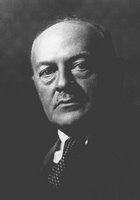I recently discovered some very important information concerning the development of philosophical anthropology as a specific formal discipline. The most notable piece of information is that it was actually Max Scheler who directly inspired and pioneered the emergence of a plethora of works on philosphical anthropology in the twentieth century, giving structure and impetus to the shaky and unstable foundation "anthropology" had prior 1928. But not only that, but it was precisely with his writings, and this revival, that the specific title 'philosophical anthropology' came to be commonly used.
For philosophy to consider anything 'anthropological' before the modern world and especially prior to the rise of psychology was only by way of implication and by following through an argument to its logical conclusions. But, according to Antoine Vergote (
Katholieke Universiteit Leuven) in a group of his essays later compiled in
In Search of a Philosophical Anthroplogy, with the diremptive approaches of modern Europe into, namely, the empiricim on the British Isles and rationalism on the continent, there arose, correlatively, an empirical psychology by especially Hume's
A Treatise on Human Nature (16), and a 'rational psychology' named by Christian Wolff and intended to be a "counterpart" to the former(15).

Interestingly though, this kind of pyschological perpective merging into the realm of philosophy ended with Kant and one of his students, the famous romanticist J. G. Herder (see John Zammito's
Kant, Herder, and the Birth of Anthroplogy
the Birth of Anthroplogy). Kant criticized philosophical psychology and suggested a new kind of
thoroughly philosophical study of human beings which was indicative of the break and new direction philosophy would follow with respect to the earlier types of philosophical psychology, particularly rational psychology(21).
Thus, this foundation prepared philosophical anthropology to embrace a "particluar form of interrogation" dealing precisely with "the question of the peculiar beings of 'human' beings" (25). This information reveals why Scheler's last book, but his first exclusively dealing with developing a philosophical anthropology, was entitled
Man's Place in Nature, or more literally, "The Situation of Man in the Cosmos" (
Die Stellung des Menschen in Kosmos) as well as others that subsequently bore similar titles, such as Arnold Gehlen's
Man, His Nature and Place in the World (Der Mensch. Seine Natur und seine Stellung in der Welt. 1940).
Most Fascinating, however, is a passage Scheler wrote in 1926 in "Man and History" which M. S. Muldoon pointed out in his preface to Vergote's book:
If there is a philosophical task for which our era demands a solution with unique urgency, it is that of a philosophical anthropology [philosophische anthropologie]. I am referring to a basic science which investigates the essence and essential constitution of man, his relationship to the realms of nature (organic, plant, and animal life) as well as to the source of all things, man's metaphysical origin as well as his physical, psychic, and spiritual origins in the world, the forces and powers which move man and which he moves, the fundamental trends and laws of his biological, psychic, cultural, and social evolution, along with their essential capabilities and realities (6).
Muldoon goes on to state how "this call for a philosophical anthropology was formally heeded in 1928" with Bernahard Groethuysen's
Philosophische Anthropologie (the very first work to bear this title and which, incidentally, has
not been translated into English from the German), followed closely by Scheler's own
Die Stellung des Menschen... (6). Of course, other major philosophical anthropologists grealy indebted to Scheler's anthropological groundbreaking were Helmuth Plessner and Arnold Gehlen (mentioned above). Today, we can identify numerous others as following, at least fragementally, this tradition started with Scheler: Cassirer, Levinas, Merleau-Ponty (heavily influenced by Scheler's notion of the lived-body), and Ricoeur.

Heidegger, of course, denied the possibility of "anthropology" outright and sought for instead, on an opposite pole, a "fundamental ontology."
The regretable aspect is that although arguably the pioneer of what we nowadays ascribe as philosophical anthropology, Max Scheler died before he could even formally write his. His last book,
Man's Place in Nature , was simply the publication of a lecture entitled "The Unique Placeof Man," with which, according to Manfred Frings' website, he captivated his

audience for over four hours. Scheler writes in the preface, "this essay represents a brief and highly condensed summary of my views on some of the main topics of the 'Philosophical Anthropology' on which I have been at work for a number of years and which will appear early in 1929."
Scheler died May 19, 1928.









